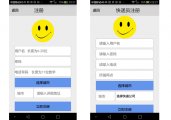基于安卓Android的快递服务APP设计(Eclipse,MySQL)(任务书,开题报告,论文13000字,程序代码)
摘要
随着智能手机的发展,开发各种功能的手机APP成为了发展趋势,越来越多行业的企业投入到APP开发中。而我国是智能手机用户大国,Android系统的使用群体十分庞大。同时,快递业作为近年来的新兴行业发展迅猛,如何提高快递服务速度和质量,如何利用移动终端带给人们更便捷的操作体验具有重要的现实意义和应用意义,进而有利于快递服务业的发展。
本文着力于设计与实现基于安卓的快递服务APP,分阶段描述了系统的设计与实现过程,首先介绍了研究背景及意义,然后采用软件工程的思想,明确系统的设计目标,进行可行性分析和需求分析,系统详细设计,系统实现和测试。本文借助UML建模语言进行分析设计,在需求分析阶段,通过用例分析和用例图描述了系统功能性需求;在详细设计阶段分模块描述了系统类设计,给出了时序图,描述系统具体实现了什么功能;在数据库设计阶段,给出了系统E-R图和数据库表结构;在系统实现和测试阶段展示系统功能实现效果图,描述了系统测试用例;最后对研究内容进行总结与展望。
系统实现了客户寄件、定位,客户查件,客户评价,快递员收,快递员回复评论,公司总部管理员管理员工信息、客户信息、网点信息等功能模块。系统在开发过程中,注重满足操作简单的要求,并寻求一个全面的系统,具有普遍性。
关键词:安卓;快递服务;软件工程
Abstract
With the development of smartphones, developing various functions of mobile phone application has become the fashion trend. An increasingnumberof enterprises have been devoted to the development of application. And there are many people using smartphones in our country. A large number of people use Android system. As a new industry in recent years, Express industry has a rapid development. So how to improve the speed and quality of express service and how to use the mobile to bring people more convenient operation experience has important practical significance .And then promoting the development of express service industry.
This paper focus on the design and development of express service application based on Android system. Describing the process using a phased method. In this paper, I firstly introduce the background and significance of the research, and then applying the design ideas of software engineering, paper makes the object of the system, define the basic demand, logic, function systemstructure and design method of the system. Analyzing in the demand stage adopts UML software modeling language. During the requirements analysis phase, through the UML use case diagram to describe the system functional requirements. During the detailed design phase, the class diagram, sequence diagram and detailed descriptions are given. In the database design phase, the E-R diagram and database table structure are shown. In the system implementation and test phase, I work out the implementation effect picture of system function to show what the functions are and gave the code of some functions. Finally, the fifth part is the summary and expectation of this dissertation.
The system realizes customers sending express, checking delivery information, making comment, courier receiving express, delivering express and administrators managing employee, station, customs information. In the development process, I pay attention to meet the requirements of simple operation, and I am devoted to seek a comprehensive system which has universality.
KeyWords:Android;express service;software engineering
1.3本文主要工作
本文主要介绍基于Android的快递服务移动终端系统的设计与实现。系统的设计与实现过程主要采用了软件工程的分析模式,使用Java作为开发语言,eclipse作为开发平台,同时使用MySQL作为后台数据库,在Android系统下进行开发调试,系统遵循C/S设计架构原则,下面针对设计与实现的各个阶段进行详细描述。
在系统需求分析过程中,在实际调研的过程中,从技术、操作、经济三个方面进行可行性分析,采用UML建模方法进行快递服务业务功能需求分析以及非功能性需求描述。在系统设计阶段根据系统具体的需要,首先明确总体设计原则,确定系统的技术路线,分析和设计功能结构图[4]。然后根据需求分析以及技术设计,完成主要功能模块的类图,数据库及表关系和时序图的设计,编写代码实现各部分功能。
1.4本文组织结构
本文分为五章,具体划分内容如下。
第一章为绪论,主要介绍了研究课题的背景及意义,国内外研究现状,详细说明了本文的主要工作,并给出了本论文的组织结构。
第二章为系统需求分析,是本文的核心内容之一,对快递服务系统的目标进行了描述,进行可行性分析,最后根据系统的目标分析功能性需求及非功能性需求,给出系统用例图和用例描述。
第三章为系统设计,是本文的重点。分为系统总体设计,系统功能详细设计和数据库设计。系统总体设计给出了技术路线和系统功能结构图,系统功能详细设计采用UML建模技术的类图、顺序图对系统模块进行详细的设计。数据库设计给出了E-R图和数据库表的结构对数据库进行了概念结构和逻辑结构设计。
第四章为系统实现与测试。系统实现部分给出了功能运行效果图,文字说明和部分核心代码。测试部分通过功能测试、性能测试进行了详细描述。
第五章为总结与展望。总结回顾全文,指出系统设计和实现过程中的不足,对未来进一步展望。
系统功能概述
客户模块有寄件,查看地图定位,查询快件信息功能,客户通过手动输入快件运单信息,填写完成后可联系快递员上门取件,查看已送达网点的快件信息,并对快递员进行评价,客户能够根据运单编号和快递公司查询快件信息。快递员可选择区域查看附近运单接单,填写预计到达时间反馈给客户,接单完成后可以为快件分配运单编号送往网点,可以对客户评价进行回复。总部管理员可以添加,修改,删除员工信息、网点信息和客户信息。
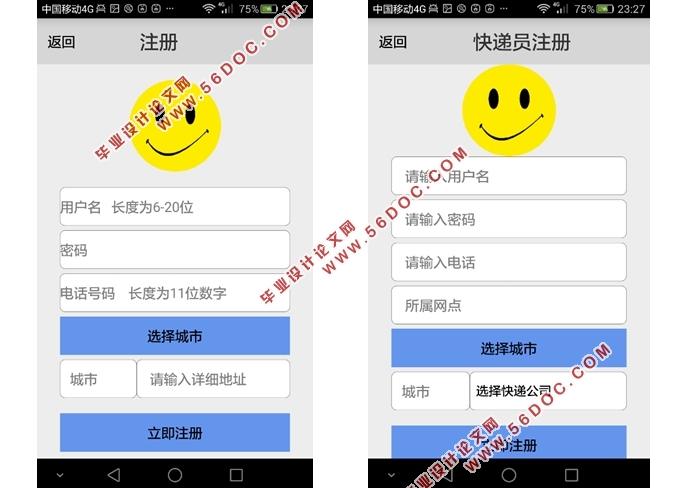
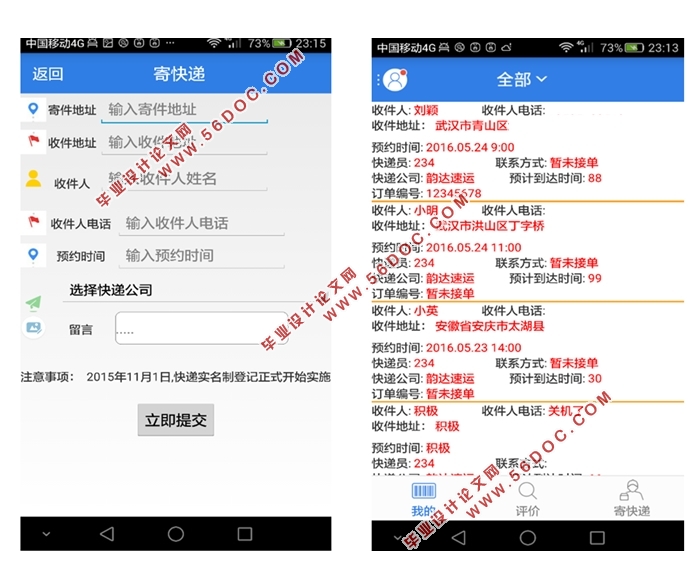
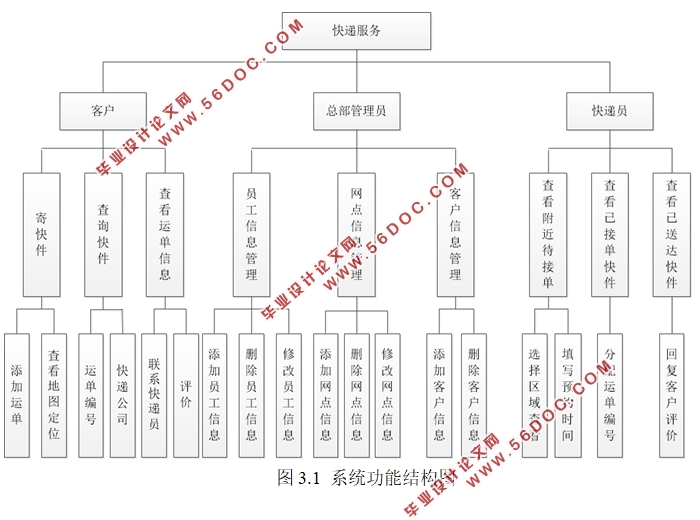
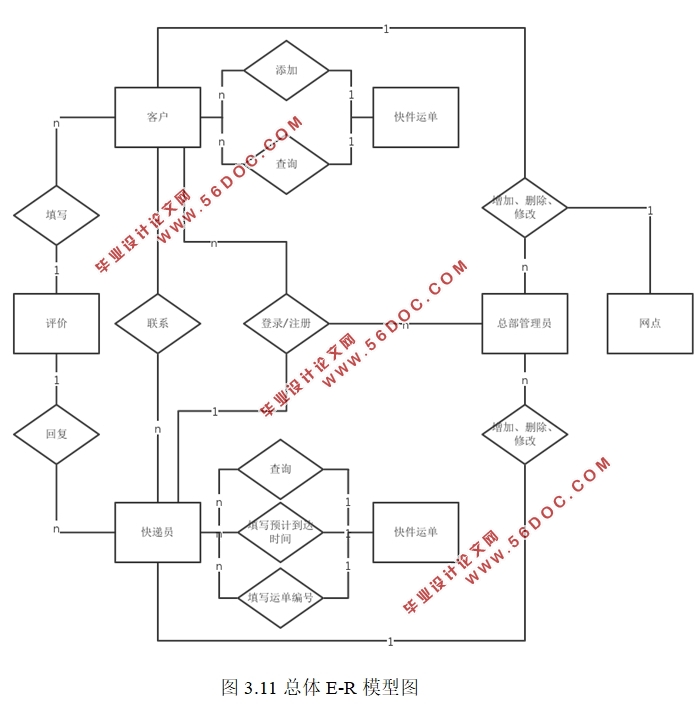
目录
第1章绪论 1
1.1背景及意义 1
1.2国内外研究现状 1
1.3本文主要工作 2
1.4本文组织结构 2
第2章系统可行性分析和需求分析 4
2.1系统的目标 4
2.2可行性分析 4
2.2.1技术可行性 4
2.2.2操作可行性 4
2.2.3经济可行性 4
2.3功能性需求分析 5
2.3.1系统功能概述 5
2.3.2系统功能需求分析 5
2.4非功能性需求分析 9
第3章系统详细设计 10
3.1系统总体设计 10
3.1.1系统技术架构设计 10
3.1.2系统功能架构设计 11
3.2系统功能模块详细设计 12
3.2.1登录注册详细设计 12
3.2.2寄快件模块设计 13
3.2.3查询快件模块设计 13
3.2.4评论模块设计 14
3.2.5接单送件模块设计 14
3.2.6信息管理模块设计 16
3.3数据库设计 18
3.3.1数据库概念结构设计 18
3.3.2数据库逻辑结构设计 19
第4章系统实现与测试 23
4.1系统实现 23
4.1.1登录注册实现 23
4.1.2寄件模块实现 26
4.1.3百度地图应用技术 27
4.1.3查询模块实现 28
4.1.4评论模块实现 29
4.1.5接单送件模块实现 30
4.1.6信息管理模块实现 32
4.2系统测试 33
4.2.1功能测试 33
4.2.2性能测试 34
第5章总结与展望 36
5.1总结 36
5.2展望 36
参考文献 37
致谢 38
|
